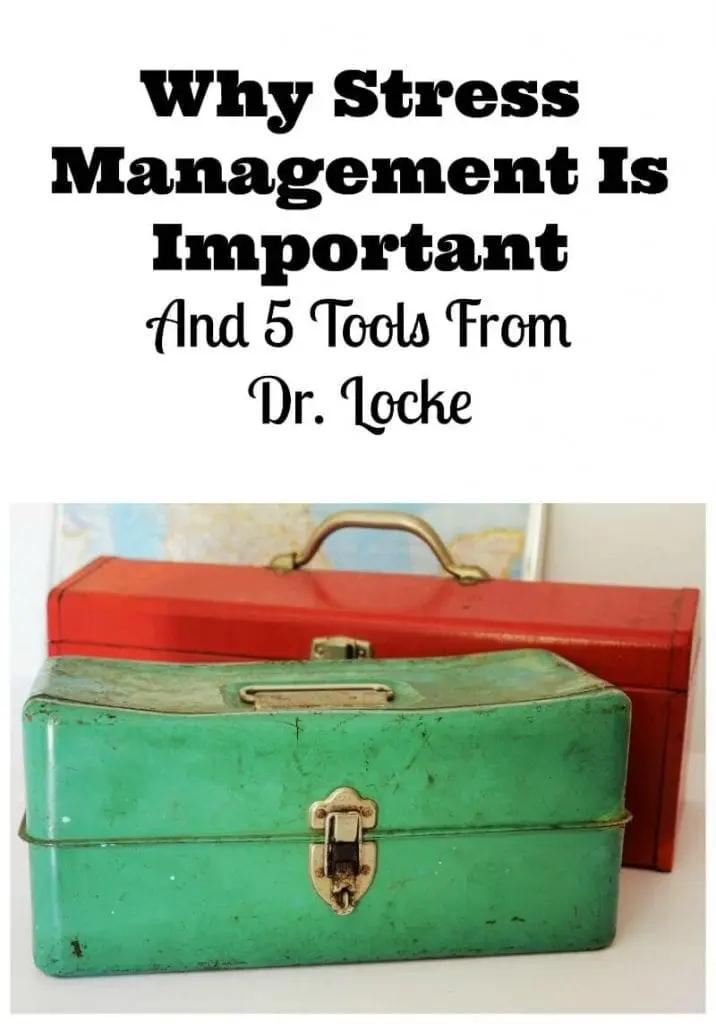Stress is normal, right? It’s just part of being a grown up, right? Yes, we are all going to feel stress at some point, to some degree, but stress management is important to helping keep that stress under control so you can be happier and healthier. It turns out that stress not only feels bad, it can have negative influences on your health as well. Today, I will share some really great tips for stress management from Dr. Carol Locke, Harvard trained psychiatrist previously on Harvard Medical School Faculty.
This post is brought to you by OmegaBrite, which was formulated by Carol Locke, M.D.

What are reasons that effective stress management is important?
We all want to be happy, healthy, productive and resilient. Learning proper stress management techniques is key to functioning at our best. While small amounts of stress are normal, prolonged intense stress can erode our health and happiness.
Stress causes a release of hormones that help us to be on alert and ready. While helpful for short term, getting stuck in a fight or flight response is not healthy for us in the long term. Under these states of high, prolonged stress, you often physically feel bad and it is not just in your head.
WebMD explains, “Stress becomes negative (“distress”) when a person faces continuous challenges without relief or relaxation between challenges. As a result, the person becomes overworked and stress-related tension builds. Distress can lead to physical symptoms including headaches, upset stomach, elevated blood pressure, chest pain, and problems sleeping. Research suggests that stress also can bring on or worsen certain symptoms or diseases.”
As the Mayo Clinic points out, “Over time, chronic stress can lead to serious health problems. Don’t wait until stress damages your health, relationships or quality of life. Start practicing stress management techniques today.”
With the increase in COVID, the upcoming elections, and the general feeling of uncertainty in these times, we are all wrestling with an increased level of stress. That is why I am happy to bring you the latest on the science of stress relief from Dr. Locke.
5 Stress Management Tools
By Carol Locke, M.D.
Here are 5 ways that you can decrease stress in your life right now (or at any time). You can do many of these with your family, kids, and friends increasing your connection as you increase well-being. Add these to your personal stress busting tool box to reach for in the moment or schedule them each day. The more often you do these, the more powerful the effect.

1. Get moving
Moving is your personal superpower for decreasing feelings of stress, depression and anxiety and increasing well-being any time any place there is a way to move. The neuroprotective effects of exercise improve cognition, memory, and neuroplasticity.
Movement releases brain-derived neurotrophic factor BDNF, which increases your neuroplasticity, helps with learning and coping, builds resilience to ongoing events, and decreases depression and anxiety. It’s one of the biggest things you can do for stress management. You can move anywhere, anytime and feel good.
So how to do it? Just take a brisk walk for ten minutes—get up, tie your shoes and go outside and walk. If you can’t get out to walk, then either turn up the music or put on your headphones and dance, move your body, shift your feet around, shift your weight. If you are in a chair move your body in any way you can, tapping feet, arms to the music. That activates your cerebellum, the key to getting positive benefits in the brain from exercise. Dancing has the added effect of combining cognition with exercise (when you dance you are thinking about where your body is in space and what your next moves will be) which is thought to be even more beneficial to the brain.
The result is decreased stress, decreased anxiety, and decreased depression. No need for dancing shoes, just dance to the music to feel stronger, smarter and better in all ways.
2. Compassionate mindfulness
Research out of the University of Wisconsin demonstrates that increasing our compassion and caring for others makes us stronger, more caring, and more positive. This increases our resilience that we use facing challenges in our lives.
So how do you do this?
You can practice compassionate mindfulness by doing the following mindfulness exercise to increase your ability to feel compassion and caring, and reduce stress and anxiety in your own life.
Start by finding a comfortable position, close your eyes and imagine someone that you feel very positive about. Imagine their eyes, the color of their hair, their smile. Feel the warmth between you as you look into their eyes. See them before you, hear their voice in your mind. As you feel the warmth you have towards them, feel the goodwill that you have towards them. Stay in that moment and imagine something that you might want to say to them, some positive statement or how you wish them well with some difficult obstacle that they have had in their life. Feel yourself wishing that they overcome that challenge and succeed completely in their life.
If your mind floats to other things and other thoughts pop in, that’s ok. Simply bring yourself back to the image of the person before you, and feel the caring connection with them and positive wishes you have for them.
Stay in that moment of warmth and experience the connection you feel towards this person. You can stay here for one minute, five minutes or even longer. When you’re ready to come back, take another deep breath, open your eyes and reorient to wherever you are, indoor or outdoor, and then carry on with your life.
You will have a greater sense of relaxation, less anxiety and stress, and a deeper sense of well-being. This is an easy tool to use in managing stress, and one you can do every day, and as you practice, you will get better and better at it.
3. Social Media Break
Taking a social media break is another huge step you can take to reduce stress, decrease anxiety, and feel more positive, particularly right now. It may feel right now like you have to check in every minute, but you don’t. And in truth, the news can wait in order for you to improve your well-being and feel stronger and calmer.
How do you go about limiting social media?
First, take Twitter off your phone. This may feel hard, but you can do it. Start by removing the twitter app from your phone. This will force you to go to your computer to check into Twitter.
Second, schedule a specific time to check social media for ten minutes only. This is a really positive way to limit your social media use. Make an appointment with yourself by setting an alarm to check in each day at three o’clock for instance. At that time, check Twitter, check the news, check other social media, facebook or instagram, and then check out again. You can use this technique for email as well, scheduling times to check then close the app.
This will be huge in reducing stress and anxiety and allowing you to feel more positive, especially important during this stressful time.
4. Laugh
Laughter is a superstar when it comes to stress relief. Why is laughter so important?
Laughter has a powerful physiological effect. Laughing increases the oxygen in your brain and causes the release of oxytocin, the feel good hormone. Oxytocin helps you bond with another person and gives you a tremendous sense of well-being. So laughter connects you with other people. It connects you to the world in a positive way.
Start by collecting funny memes, funny images, videos, or cartoons that you can keep in a folder for yourself and to share with your family and friends.
Then schedule 10 minutes a day (or more frequently) to break up the moment with something funny that will decrease your stress, decrease any anxiety, and will simply increase your well-being.
Even better use that ten minutes to share that funny image, cartoon or video with someone else. This can be your children, family or friends. By sharing you increase your connection which also increases your positive feelings and breaks stress.
Next, think of someone who might be alone, or having a tough time, and call and share something funny with them or send an email or text to give them a break too. Helping someone else laugh is the best but you can always do this on your own too.
Not only does laughter connect you with other people and break up the moment, it’s something you can actually learn to do everyday and build into your stress-busting toolbox.
Laughing can help you recover from illnesses, and just live a better life. And it’s something that you can always share and connect in with family and friends. It’s also a very positive thing for your kids to learn, developing and sharing funny things that family and friends can laugh about together.
Laughter is one of your superpowers for feeling good, decreasing stress, and increasing well-being.

5. OmegaBrite 70/10 MD Omega-3
Adding OmegaBrite to your daily routine gives you a safe, natural way to add health, reduce stress, and reduce anxiety without drug-like side effects.
OmegaBrite is a special formula high EPA Omega-3 supplement I developed while on faculty at Harvard Medical School. It’s been clinically shown to decrease anxiety by 20% in a double blind placebo-controlled study done by Ohio State University.
In the same study, OmegaBrite was shown to support a healthy inflammatory balance by decreasing inflammatory cytokines by 17%.
This study was done specifically using the OmegaBrite 7010MD formulation. While all omega-3’s are very good for your health, different omega-3 ratios and formulas have different health benefits. The benefits from this study were based on the study’s use specifically of OmegaBrite’s advanced 7010MD formula.
How do you add OmegaBrite 7010MD Advanced Omega-3 for stress management?
Start by taking 3 softgels a day. Allow your body time to see how you feel on this dose over a week or two, then you can increase to 4 capsules a day and eventually if needed go to six small gelcaps a day.
4-6 softgels a day seems to be the “sweet spot” for most people, a finding backed up by the clinical research. Allow yourself several weeks for your body to experience the benefit.
It’s best to take OmegaBrite with your highest fat meal of the day. This helps achieve optimal absorption. It can be morning or night. Some people take their OmegaBrite once a day, others prefer splitting it with meals.
Adding OmegaBrite gives you a safe, natural, drug-free way that you can add health, reduce stress, and reduce anxiety.
You can learn more about OmegaBrite or place your order at omegabritewellness.com
Conclusion
Effective stress management is crucial because it helps maintain physical health, emotional well-being, and overall life balance. Unmanaged stress can lead to serious health problems like heart disease, high blood pressure, and weakened immune function. It also negatively impacts mental health, contributing to anxiety, depression, and burnout. By managing stress effectively, individuals can enhance their productivity, improve relationships, and make better decisions, leading to a more fulfilling and healthy life.
While small amounts of stress are normal, stress management is important to help reduce long term or intense periods of stress. Stress management tools help you to be more resilient, feel better, and stay healthier. I hope find Dr. Locke’s five great tips on the science of stress relief helpful. I know for me personally, I employ all 5 tools and I think they are all very helpful to me! Have you been feeling more stressed than normal lately?
Related Posts:
Coping Skills For Stressed Parents
